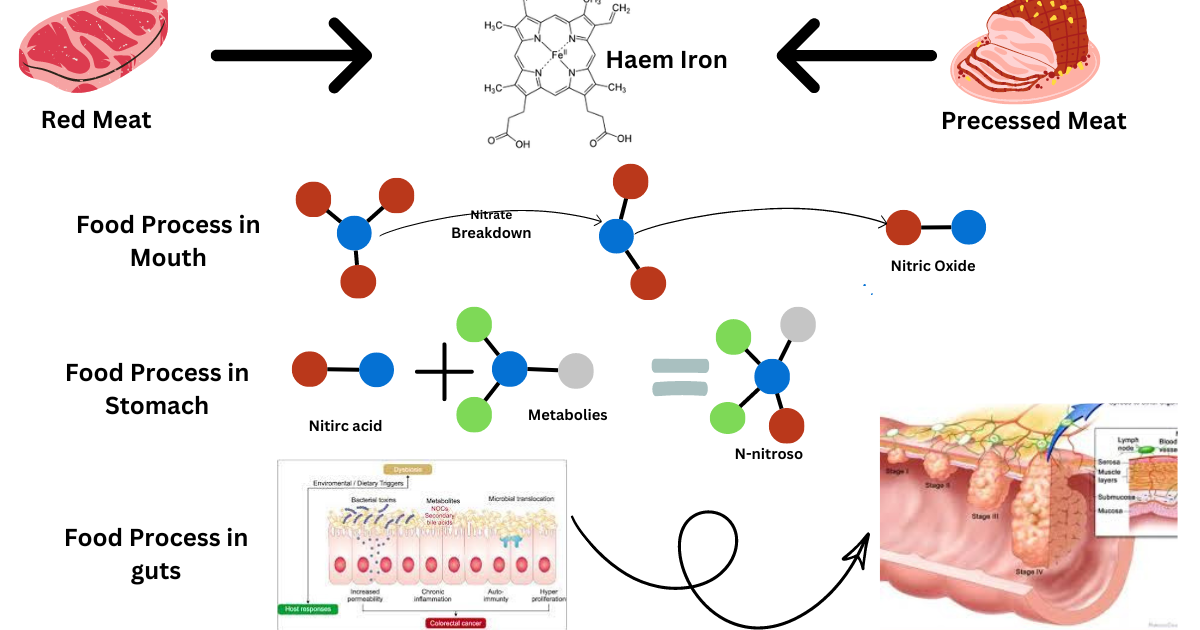There are a variety of disadvantages of eating meat daily like type-2 diabetes, colon cancer, and obesity due to the high content of saturated fat.
Let’s cover some points in detail.
Is it okay to eat meat daily?
No, eating meat daily is not okay as it comes with saturated fat. Eating meat daily increases body cholesterol levels, which further can increase heart disease, stroke and other problems. Eating a lot of especially red and processed meat can increase the risk of colorectal cancer.
How often should you eat meat?
According to the Cancer Council, one can consume about 455gm( or 700gm of raw meat) of cooked red meat per week. One can break down this 455gm and consume it in 2 to 3 servings per week.
Dr. Gundry ( a cardiologist, heart surgeon, medical researcher, and author) stated that eating red meat is healthy for some days and helps in fulfilling certain health benefits and also helps in getting rid of some health problems but longer use of red meat produces excessive hydrogen sulfide gas is very dangerous for colon wall.
What does Ayurveda say about the carnivore diet?
According to the International Ayurvedic Medical Journal, there are 3 stages of mental level Satva (pure state), Rajas and Tamas state. All the non-veg lies in Rajas and Tamas state. Regular intake of non-veg food can lead to the reduction of sattva. Ayurveda also states that body and mind are closely related and the disease comes under psycho-somatic and will affect your body.
In general, Ayurveda suggests meat diet as a therapy for example if a person is unhealthy or weak then he/she should consume meat as a source of therapy to fulfill nutrition needs.
Ayurveda also advocates the intake of non-veg foods in moderation.

Consumption of meat according to Ayurveda
Here are a few overviews of meat according to Ayurveda –
- Pork should be avoided because it is not considered a good meat for anyone.
- Only Vata prakriti people should consume beef.
- The dark meat of the chicken is considered best for vata prakriti people and white meat is for pitta and kapha prakriti.
- Turkey should be consumable by pitta and Kapha prakriti. The dark part of the meat is considered for vata prakriti people as it is cold, sweet and light in all qualities.
- Rabbit is worst for all types of people.
- A goat is preferable for all body types. Ayurveda allows goat meat as a medicinal diet.
- Vata Prakriti people should stay away from Deer meat.
- Pitta and Kapha Prakriti should eat only from fresh water, not sea but Vata Prakriti people can eat all types of fish.
List of all types of meat

Red meat/processed meat-
- Beef
- Lamb and Mutton
- Pork
- Veal
- Vension
- Goat
- Sausages
- Bacon
- Ham
- Salami
- Corned beef
List of Poultry based Meat
- Chicken
- Turkey
- Duck
- Goose
- Game Birds
- Rabbit
What are the 4 disadvantages of eating meat daily?
- Regular meat eaters are more prone to Colorectal cancer.
- Red meat consumption daily can lead to heart disease. Meat consists of high sodium content. This high sodium content in meat leads to high blood pressure, which is enough to increase the risk of heart attack, stroke and clogged arteries. According to one of the studies, it will increase heart disease by 15%
- Overconsumption of meat may lead to stomach disorders like bloating, constipation etc.
- One of the Medical Life Science news consumption of red meat daily increases the risk of diabetes by 30%.
Is red meat bad for your colon?
According to the Cancer Council, a chemical called haem is present, which is broken down in our gut and results in the formation of N-nitroso chemicals. N-nitroso chemicals damage the cell line of the bowel and this could lead to bowel cancer.

According to Dr. Gundry, our body produces hydrogen sulfide gas which is beneficial for the body but excessive production of this gas damages the colon wall and results in colon cancer.
Can too much red meat cause high blood pressure?
Yes, eating too much red meat can cause high blood pressure. The high sodium content present in red and processed meat causes high blood pressure later results in heart attack.
Is red meat once a week ok?
Yes, red meat once a week is ok, even consumption of red meat 2-3 servings per week is ok. On other days, you can prefer a veg diet like pulses, vegetables, fruits, etc. Apart from a veg diet, individuals can also consume chicken, fish and turkey depending upon their digestion process.
5 advantages of switching from a meat diet to a Veg diet
- Blood Cholesterol level will dive rapidly- An increase in blood cholesterol level is the major cause of heart attack. Primarily found saturated fat in meat leads to an increase in heart issues by 15%. Various consistent studies show a drop of up to 30% in blood cholesterol levels when the individual switched from a meat to a veg diet.
- Plant-based diets are rich in fiber, which promotes the growth of friendly bacteria in our guts. These bacteria not only help in good digestion but also help in producing critical nutrition and training our guts.
- In a study conducted by NCBI, it was concluded that daily meat consumption can result in type 2 diabetes, so switching the diet leads to a drop in type 2 diabetes.
- Once switching the diet, an individual can lower the risk of colorectal cancer.
- The slaughter of meat results in the emission of greenhouse gases, which contribute to 15% of rising heat in the environment. Switching the diet can help in establishing a good relationship with the environment.
In conclusion, red and processed meats are tasty and convenient dietary options since they provide important nutrients like protein, iron, and vitamin B12. On the other hand, excessive consumption is associated with higher risks of cardiovascular disease, some types of cancer, and emissions from livestock farming that affect the environment. Although they can be included in a balanced diet, moderation is key. When making dietary decisions for long-term health and sustainability, it is crucial to take into account the trade-offs between their nutritional benefits and potential health risks as well as environmental impacts.
Read about Bad Food Combinations


This post was really thought-provoking. I’ll definitely be reflecting on it.